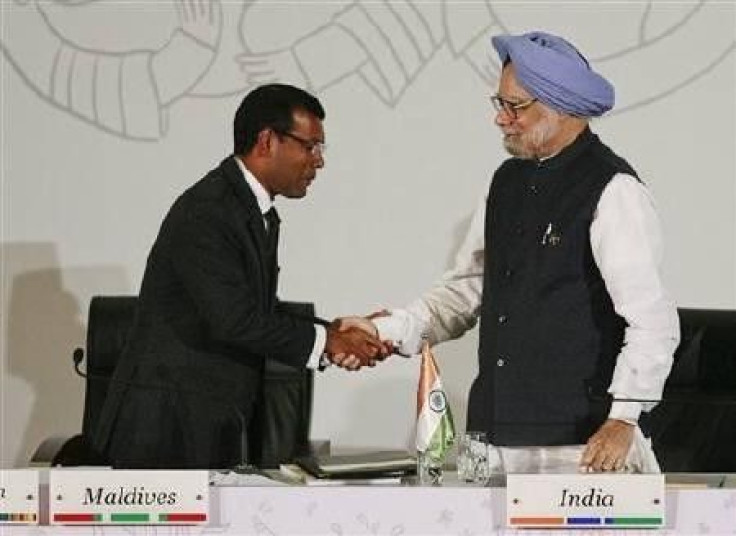Cold War: China Tries to Woo India’s Best Friend Maldives

On the pristine equatorial shores of the Maldives, an archipelago best known for luxurious resort hideaways swathed in coral reefs and cerulean seas, India and China's regional cold war is warming up.
Stretched across 90,000 sq km (35,000 sq m) of the Indian Ocean southwest of India, the Sunni Muslim nation of 1,192 islands finds itself sandwiched between the two Asian rivals, and both flexed their muscles at a meeting of South Asian nations hosted by the Maldives last week.
China preceded the heads-of-state meeting of the eight-nation South Asian Association for Regional Cooperation (SAARC) by opening its first embassy in the Maldives, a ceremony attended by Vice Foreign Minister Zhang Zhijun.
Two Maldivian officials said China had hurriedly rented a space to open the embassy in time for the summit, while the actual embassy is being built. Officials with the Chinese delegation declined repeated requests by Reuters for comment.
The bureaucrat in me says the timing is right. You want to open something like that when there is a big official around. But opening it right before SAARC is a way to tweak India, an Asian diplomat told Reuters on condition of anonymity.
China joins India, Sri Lanka, Pakistan and Bangladesh as the only countries with full embassies in the Maldives and, at the SAARC meeting, Beijing pushed to have its observer status raised to dialogue partner, an elevated standing it has with the Association of Southeast Asian Nations (ASEAN).
There was no hurry or further discussion to make China a dialogue partner, Maldivian President Mohamed Nasheed told reporters after the meeting.
INDIA'S NEIGHBORHOOD
India's response to China's diplomatic display included a show of military force and political largesse. Navy frigates patrolled off the Gan atoll, where the summit was held, to protect VIP visitors including Afghan President Hamid Karzai, and Prime Minister Manmohan Singh held a one-day state visit to the capital island, Male.
This is our extended neighborhood. We wish to work with the Maldives and other like-minded countries to ensure peace and prosperity in the Indian Ocean region, Singh told the Maldivian parliament.
India extended a $100 million credit line, inked pacts on maritime and counterterrorism cooperation, and both nations agreed their respective territories would not be allowed for any activity inimical to the other and by any quarter.
New Delhi has long been concerned by any moves China makes to boost its presence in neighboring countries, and is worried about the so-called string of pearls ambition to expand Chinese maritime influence in the Indian Ocean and beyond.
China has made a lot of surge in the Indian Ocean rim countries. Maldives is of particular interest because it can help China gain access to the main regional forum, SAARC, Bhaskar Roy, a strategic affairs expert at the Chennai Centre for China Studies, said.
China made its present felt throughout the SAARC summit. The post-summit giveaway bag included porcelain pens and diaries from the Chinese Foreign Affairs Ministry detailing Five Years of China-SAARC Cooperation. A box for a new 40-inch TV in the media centre bore a sticker: China Aid.
CHINA'S TOURIST TAP
While India may have the edge in terms of political clout and military cooperation, China has a softer but no less powerful lever over the Maldives' $1.5 billion economy.
It is the top provider of visitors to the tourism industry, which earns 28 percent of gross domestic product and 90 percent of foreign exchange, with stays costing up to $1,000 a night at paradise resorts on desert islands of pure-white beaches, palm trees and incomparably hued waters.
Chinese tourist arrivals doubled year-on-year in 2010, according to the Maldives Ministry of Tourism, Arts and Culture. By September, this year's 146,668 visitors from China were well past 2010's total of 118,961.
The Chinese can buy their way into this country. All they have to do is put out a travel advisory saying too many people are drowning and that's it, they will turn those tourists off like a tap, a senior Maldivian official said on condition of anonymity.
The China surge has been a godsend for tourism operators who traditionally rely on Europe and other Western countries for the bulk of visitors, but have seen those numbers fall with the downturn in developed-world economies and European debt crisis.
The Maldivian government wants to maintain an appropriate balance between Maldives and India and other investors and not have any one country dominate them and exercise inordinate influence over them, a senior U.S. administration official told Reuters on condition of anonymity.
The United States remains concerned, as does India, about China's plans in the Indian Ocean, the official said. I think it is important to try to continue to engage them, to stress opportunities for working together, and to stress the importance of them being as transparent as possible about what their economic and military intentions are, the official said.
The president, Nasheed, was unequivocal when asked how the Maldives would avoid becoming a pawn between Asia's giant rivals.
We've made it very clear that India is our best friend and neighbor and we will continue along those lines, he told reporters, prompting immediate questions from journalists present from China's state media. There won't be any issue because of the Maldives' friendship with any other country, Nasheed added, smiling.
© Copyright Thomson Reuters 2024. All rights reserved.











